Let's say for example:
-Food(class
-Bread(instance of Food!
-Species(class
-Animal(class
- Horse(class
-Unicorn(instance
Now I need to be able to set Bread -> eatableBy -> Horse. But I can't make a object property assertion to a class. So I could set it eatable by and add all the instances of Horse, but I have a lot of instances so that would be a bit redundant. Does anybody know a good efficient way to do achieve the same effect?
E.g. If I need to know what Horses can eat it needs to return Bread also. If I want to know all the food an Unicorn can eat, it needs to return Bread (because it's a horse and all horses eat bread). If I need to know what the subclasses of Animal eat, it also has to return Bread.
